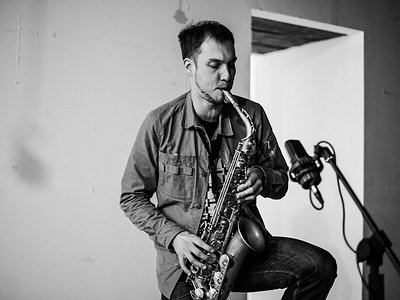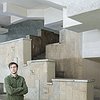Part 1
Name: Ilia Belorukov
Nationality: Russian
Occupation: Musician
Current Release: Studio Album with Jason Kahn on Notice Recordings
Recommendations: Building Stories by Chris Ware. It’s amazing how he did a free structure of the whole story and splitted it into different pieces of paper that you can read in any order you want / Madacy Jazz community. Sam Sfirri and Keiran Daly explore a kind of de-construction of jazz music in a very special way, using MIDI technologies to make abstract music between academic music, experimental electronic and improvisation. It’s quite raw music, so it could be not so easy to listen to it. I need some kind of mood for it, but when I have it, I really enjoy it.
Website/Contact: Ilia shares his latest release and project news on his website http://belorukov.blogspot.com/
When did you start writing/producing music - and what or who were your early passions and influences? What is it about music and/or sound that drew you to it?
I began to play gigs on alto saxophone in 2007, it started from projects with musicians from a free improvisation scene in Saint-Petersburg. Before that I studied at music school, had some rock-oriented projects with schoolmates, some experiments with electronic music on the computer. Now I’m playing improvised music on saxophone or modular synthesizer, doing compositions on the computer with different sound sources and sometimes writing for ensembles.
I've been listening to a lot of music since childhood, always wondering how music was made. I analyzed Led Zeppelin structures in songs or learned about Scriabin’s idea of music and light or tried to understand the non-idiomatic music of Derek Bailey. At some point it was an organic move to start to create something on my own, because I didn’t find what I wanted in the music of others. I thought that there could be something else out there.
For most artists, originality is first preceded by a phase of learning and, often, emulating others. How would you describe your own development as an artist and the transition towards your own voice? What is the relationship between copying, learning and your own creativity?
Sure, I was trying to emulate some saxophone players. After some time I understood that it’s hardly possible to play like them and that I had to find my own direction. But you can’t avoid some influences. I think I’m still on that journey. When I learn things from other musicians, I try to adapt it to my own playing. Sometimes it fails, but sometimes I succeed finding new context for fresh skills and making them sound like my music.
What were your main compositional- and production-challenges in the beginning and how have they changed over time?
I always had an interest in processing sound. I had some periods: playing sax with effect pedals, sax with preparations, sax with contact microphone on the bell and small amplification, sax with laptop. Every time I got quite different results and enjoyed new experiences. For many years I tried to mix acoustic and electronic instruments, only a few years ago I decided to split these activities. Nowadays I keep practising the alto saxophone and exploring electronic sounds with a modular synthesizer, while being involved in recording-mixing-mastering processes.
What was your first studio like? How and for what reasons has your set-up evolved over the years and what are currently some of the most important pieces of gear for you?
Basically I can practice and do music at home, thanks to the neighbours. I've used quite a few studios that were rented with colleagues for rehearsals and recording sessions of many projects.
Through the years I have had an endless process of trying one or another piece of gear for saxophone or for synthesizer or for electronic setup. I quite like the process of searching for musical things on the secondhand market, but lately I’m less involved in this routine. Mainly because I can finally say that I found a good combination of reed/mouthpiece on sax and completed a portable modular synthesizer setup that I don’t want to expand, because then I’m not able to take it for travels and even rehearsals because of the size/weight.
How do you make use of technology? In terms of the feedback mechanism between technology and creativity, what do humans excel at, what do machines excel at?
Technology can be a very useful tool to make interesting sounds, but sometimes there’s no music as a result. I always ask myself how to hide technology when using it. If I can’t get something that I’d like to use for music, I prefer to skip it.
Production tools, from instruments to complex software environments, contribute to the compositional process. How does this manifest itself in your work? Can you describe the co-authorship between yourself and your tools?
At some point I began to enjoy the unpredictability that I can take from any instrument or tool and use it as an approach for music. If I play on saxophone, I can find alternative fingerings and get some half-predictable sounds and it’s a way to find something that I haven't used before.
One of most recent works is a 20-minute piece called “Nrd Drm Two, 100-1000, Forward and Reverse”. Firstly I recorded a 1-step pattern on the drum synthesizer with different tempo rates. Because of that, it sounds different and on high BPM’s (above 300) it makes mostly long tones/drones and the machine plays it differently with each tempo. Next step was to use mp3 codec to transform a 44kHz/24bit file to 8kHz/8kbps, because it was released on 1’44Mb floppy disc. This process by computer was unpredictable and gave me some results that I found great. All this I can call composition where I used basic ideas of my own and then worked with machines to get the result.
Collaborations can take on many forms. What role do they play in your approach and what are your preferred ways of engaging with other creatives through, for example, file sharing, jamming or just talking about ideas?
Because I’m quite far from centers of improvised music, I use almost all possibilities to work with people from abroad: discussions about music and what we can play, multitrack file sharing compositions, online recordings during Covid-19 times… Now it’s quite nostalgic to talk about it, but I used to do some touring each year and met friends and new people and did concerts and recordings.
For most cases I prefer to play improvised music and my main interest is still improvisation of different forms from free jazz and free improv to electroacoustic and reductionism or whatever. In this kind of music collaboration, eye-to-eye and ear-to-ear contacts are the most organic thing to do and best way to make music together.






